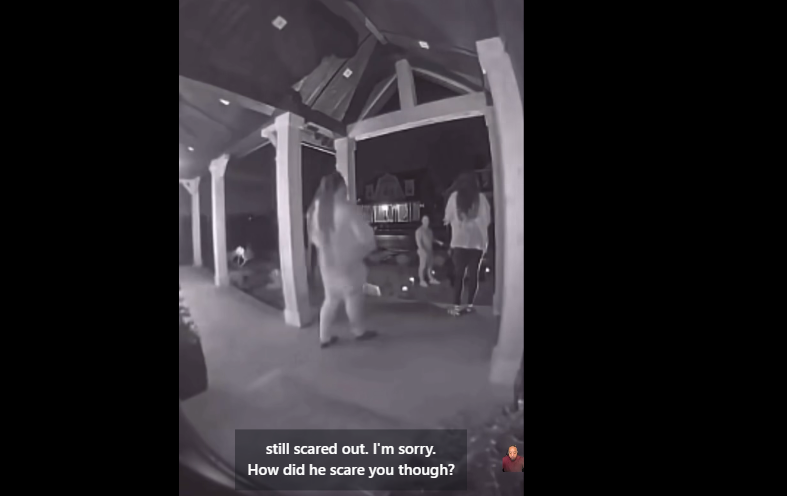Columbus, Ohio – In a deeply troubling encounter, DaMichael Jenkins, a prominent Ohio real estate developer, posted a video documenting an incident of alleged racial profiling after a neighbor, identified as Michelle Bishop, accused him of following her near his own home. The confrontation occurred in Jenkins’ driveway, where Bishop, accompanied by her two children, questioned whether he lived there and dismissed his affirmation, saying, “I don’t believe you.”
The incident escalated as Bishop fled and called for help, alleging that Jenkins was chasing her. The video, shared by Jenkins, has since gone viral, igniting widespread discussions about racial profiling and implicit bias.
The Incident: Confrontation in Jenkins’ Driveway
According to Jenkins’ account and the footage, the incident occurred as he was driving slowly through his neighborhood, admiring a neighbor’s Christmas lights. Upon pulling into his driveway, Jenkins was met by Bishop and her two children near the entrance of his home.
In the video, Bishop confronts Jenkins, asking, “Do you live here?” Jenkins responds affirmatively, stating that he does indeed live at the residence. However, Bishop dismisses his response, replying, “I don’t believe you.”
Bishop, visibly nervous, then begins to flee with her children while calling for help. In the footage, Jenkins remains calm and explains the situation, noting that he had been driving slowly because he was admiring holiday decorations in the neighborhood.
Bishop, defending her actions, says,
“Well, you just have to understand my point of view, being by myself with two kids. I saw a car coming, and I was like, ‘Oh, it scared me!’”
Jenkins Speaks Out: A Frustrating Reality
DaMichael Jenkins, a respected real estate developer with a significant presence in Ohio, expressed his frustration and hurt over the incident. In a follow-up statement, Jenkins said:
“This isn’t just about me. This is about how people of color are often treated in spaces they rightfully belong to. I was in my own driveway, and I was made to feel like an intruder.”
Jenkins explained that he chose to record the encounter to shed light on the everyday realities of racial profiling and to initiate a conversation about implicit bias.
Michelle Bishop’s Defense: Fear and Misunderstanding
Bishop, in the video, attempts to justify her actions by pointing to her fear for her children’s safety.
“You have to see it from my perspective. I didn’t know who you were, and I panicked.”
However, critics argue that her assumptions were rooted in racial bias, leading her to question Jenkins’ presence in his own neighborhood.
Public Reaction: Outrage and Support for Jenkins
The video has sparked widespread outrage, with many taking to social media to condemn Bishop’s actions and show solidarity with Jenkins.
One Twitter user wrote:
“This is unacceptable. DaMichael Jenkins shouldn’t have to justify his presence in his own driveway. Racial profiling has no place in our society.”
Another added:
“This is a classic example of implicit bias. People need to confront their prejudices and stop making baseless assumptions.”
Community leaders and activists have also weighed in, urging for greater education on implicit bias and the harmful impact of racial profiling.
Racial Profiling in Everyday Life: A Persistent Issue
Incidents like this highlight the ongoing issue of racial profiling in America. For many people of color, encounters that should be routine often turn into moments of scrutiny, fear, or conflict.
Civil rights advocate [Name] commented:
“Racial profiling isn’t just about police interactions; it’s about everyday interactions in neighborhoods, stores, and workplaces. These assumptions can lead to harmful consequences, both emotionally and physically.”
Legal and Social Implications
While no legal action has been taken at this time, incidents like these often have lasting social consequences. Jenkins has stated that his goal in sharing the video was not to incite anger but to spark meaningful conversations about race, bias, and understanding.
He said:
“I hope this incident serves as a wake-up call. We need to address these issues head-on, not just for me but for everyone who’s been in a similar situation.”
Community Response: Calls for Change
Local organizations and activists in Columbus have rallied around Jenkins, using the incident to call for community education on implicit bias and racism. Churches, schools, and community centers are organizing events and workshops aimed at fostering greater understanding and inclusivity.
One community leader shared:
“This incident is a reminder that we still have a lot of work to do. Change begins with conversations and accountability.”
Bishop Faces Backlash and Calls for Accountability
Bishop, meanwhile, has faced backlash on social media and within the local community. While some sympathize with her expressed fear, others argue that her actions perpetuate harmful stereotypes.
A resident of the neighborhood stated:
“Fear is no excuse for profiling someone. If she truly felt unsafe, she should have called authorities instead of making baseless accusations.”
Moving Forward: A Call for Dialogue and Change
Jenkins has expressed hope that the incident will lead to constructive dialogue and a broader understanding of the challenges faced by marginalized communities. He has also encouraged others to share their stories to amplify awareness about racial profiling.
“This isn’t about blaming or shaming; it’s about educating and creating a safer, more inclusive environment for everyone,” Jenkins said.
Final Thoughts: A Lesson in Awareness and Accountability
The incident involving DaMichael Jenkins and Michelle Bishop serves as a stark reminder of the persistent challenges posed by implicit bias and racial profiling. As the video continues to circulate, it is sparking vital conversations about race, fear, and the need for systemic change.
The hope is that incidents like these will lead to greater awareness and empathy, ensuring that no one is made to feel like an outsider in their own home.
Justice begins with understanding. Let’s all work toward a future free of prejudice and profiling.


Leave a Reply